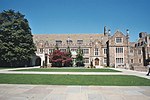Duke Cancer Institute
The Duke Cancer Institute (DCI) is a National Cancer Institute-designated Comprehensive Cancer Center, research facility, and hospital. Founded in 1971, the center is part of the Duke University School of Medicine and Duke University Health System located in Durham, North Carolina, United States.The center specializes in the treatment and prevention of cancer and was ranked 41st in the U.S. News & World Report's 2021 list of top cancer hospitals. More than 10,000 new cancer patients are seen at Duke each year. The institutesinged the National Cancer Act of 1971 and became an NCI-designated cancer center in 1973.In November 2010, Victor Dzau, MD, chancellor of health affairs for Duke University, formally unveiled the Duke Cancer Institute, during the topping out ceremony for the new building.The DCI is a single entity—the first of its kind at Duke—that integrates and aligns patient care and basic and clinical research with the goals of improving patient outcomes, decreasing the burden of cancer and accelerating scientific progress.Michael B. Kastan, a cancer scientist and Director of the Comprehensive Cancer Center at St. Jude Children’s Research Hospital, was named as the first Executive Director of the Duke Cancer Institute in May 2011. Eun-Sil Shelley Hwang became the institute's first female Chief of Breast Surgery.On February 27, 2012, the Duke Cancer Institute opened the Duke Cancer Center, a new seven-floor building devoted exclusively to cancer care.
Excerpt from the Wikipedia article Duke Cancer Institute (License: CC BY-SA 3.0, Authors).Duke Cancer Institute
Research Drive, Durham
Geographical coordinates (GPS) Address Nearby Places Show on map
Geographical coordinates (GPS)
| Latitude | Longitude |
|---|---|
| N 36.003767 ° | E -78.938812 ° |
Address
Research Drive 404
27705 Durham
North Carolina, United States
Open on Google Maps






